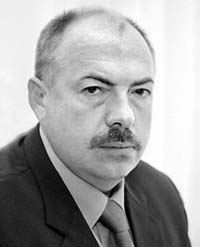The start of the trial of two police officers accused of killing journalist Heorhiy Gongadze is being delayed by the lack of two key elements: police general Oleksiy Pukach whose whereabouts are unknown and the original audio recordings allegedly made by former presidential guard Maj. Mykola Melnychenko in the office of ex- president Leonid Kuchma. Prosecutor-General Sviatoslav Piskun revealed this last Thursday in an unprecedented interview published by the newspaper Komsomolskaya pravda v Ukraine.
In October 2003 ex-chief of the Interior Ministry’s surveillance and intelligence department, Gen. Oleksiy Pukach, was arrested as part of the investigation into “the Gongadze case” and accused of abuse of office. Prosecutors claim that he destroyed documents proving that Gongadze had been placed under surveillance. A week later Prosecutor-General Sviatoslav Piskun was dismissed from his post.
In early November of the same year a court ruled to release Pukach from custody under a written pledge to stay in the city. Soon after the newly-appointed Prosecutor-General Hennadiy Vasilyev threw out the case, and the general went into hiding.
In March 2005, after former Interior Minister Yuriy Kravchenko, whom the Prosecutor-General’s Office was going to interrogate over the Gongadze affair, was found dead, the current Interior Minister Yuriy Lutsenko announced that the life of Gen. Pukach was in danger and urged the latter to surrender for his own safety.
“Pukach knew a lot of things and he had a lot of influence. I hope that if he hears me, he will understand that the Prosecutor-General’s Office of Ukraine may be the safest place in the world for him,” Mr. Piskun said in the interview. “It’s very simple. Pukach’s arrest would inevitably have been followed by Kravchenko’s. You see, if Kravchenko had begun to testify, this would immediately have raised the question of Kuchma’s liability even if we had known nothing about the Melnychenko tapes,” he said, adding that he was well aware of the consequences of his actions.
Asked if Kravchenko’s death will foil the investigation into the Gongadze case, Mr. Piskun said that the Prosecutor-General’s Office has sufficient evidence even without the ex-minister’s testimony. “Mr. Kravchenko’s testimony would have been very important to this case, but his suicide will not hinder us from unraveling the crime.”
“As prosecutor-general, I would like to say to Gen. Pukach that his guilt has been fully proved and the general’s further destiny is in his own hands. Under the law, he is entitled to a commuted punishment if he voluntarily gives himself up to law-enforcement bodies. I personally guarantee Pukach that all procedural norms will be observed. I personally guarantee Pukach the main thing — his life and his health,” he stressed.
According to Mr. Piskun, the arrest of Gen. Pukach, who was being protected by the Kuchma government, within the framework of the investigation into the Gongadze affair was the reason why he was dismissed as prosecutor-general. When Piskun was reinstated in December 2004, he assured the public that if it is proved that this country’s highest-ranking officials tried to foil the investigation of Gongadze’s murder, they will “land in the dock.”
The prosecutor-general also said that Petro Poroshenko, who was a member of the Our Ukraine parliamentary faction at the time, visited him two days before Kuchma signed the decree regarding his dismissal and said, “Mr. Piskun, we have information that parliament is going to vote you out of office. Our Ukraine will not allow this to happen. Viktor Yushchenko is backing you.”
Commenting on whether the Melnychenko tapes will be considered as evidence, Mr. Piskun said firmly, “Once I receive the original recordings, I will immediately use them as evidence.”
He said that work to authenticate the tapes began in 2003. “I began to believe in the authenticity of the Melnychenko tapes when our prosecutors established that the recordings showed the authentic voices of Kuchma and Kravchenko as well as of Kuchma and Shcherban, who are discussing the illegal privatization of the Sumykhimprom Company. Some other fragments of the Melnychenko tapes have also been found to be authentic,” the prosecutor-general said.
He also emphasized that the prosecution would make use of the results of an analysis of the recordings done by Back Tack, a US company, although it “contains a very vague wording.” They do not indicate exactly what fragment of the recordings is being analyzed. “We are definitely going to use Bruce Koenig’s expert findings. I am convinced that in any case the Melnychenko tapes will be used as evidence at the trial,” Mr. Piskun said. Asked if such strange problems, such as the prosecutor-general’s failure to make direct contact with Melnychenko and gain access to the original tapes are connected to backdoor negotiations between some of the recorded individuals and Melnychenko, Mr. Piskun said, “I do not think so. President Yushchenko said in no uncertain terms: politicians will be answerable to their conscience, and criminals to the law. Those implicated in the crime will be brought to justice. The investigators in charge will determine the measure of responsibility of every person recorded on the tapes.” Mr. Piskun reiterated that the investigators are now working to see if the Melnychenko tapes can be used in future criminal trials. “There are hundreds of details there, which cannot, unfortunately, be considered as evidence in court, at least for the time being, but they are excellent operational materials. When the tapes are duly examined and their authenticity is confirmed, the prosecutors will have their work cut out for them for many years to come. It’s a real Klondike for an investigator,” Mr. Piskun noted. “Once the Melnychenko tapes have been attached to this case, the prosecutors will be ready to hand over the materials to the court. We do not plan to play a waiting game with the trial,” the prosecutor-general said in conclusion.







